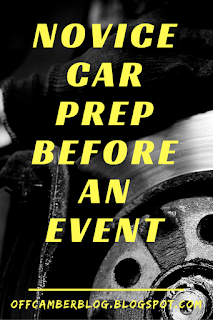Safety Check
You need to make sure your car is safe for the event. Keep in mind that your car will be asked to do things far in excess of what it would do on the street so "safe to drive" isn't always "safe to race". This is especially true for track events, where you can easily wear out a new set of brake pads in one event. Check your tires, are they worn out? Are they dry rotted? Replace them! Are your brake pads more than halfway through their lives? Replace them! Brake fluid more than three years old? Get it replaced! Fluid leaks? Get them fixed! No one wants to drive through the oil dripping from your car.
Battery Tie Down
 This is such a common issue with novice's cars that it deserves it's own section. Your battery must be secured with tie downs (factory is best) and be unable to slide off it's tray. Zip ties work in a pinch but shouldn't be a permanent solution.
This is such a common issue with novice's cars that it deserves it's own section. Your battery must be secured with tie downs (factory is best) and be unable to slide off it's tray. Zip ties work in a pinch but shouldn't be a permanent solution.Empty Out Your Car
If it's not nailed down and not required for the trip to and from the event you should get it out of the car. Clean out the back seat, empty the trunk, and get the junk out of the glove box. These things all fly around on course and at the least make a lot distracting noise and at worse fly around and hit you or fly out an open window.
Check The Oil
Your car is going to be pushing g-forces it would never see on the street and if it's getting low on oil you could have a serious problem on course when your car starves of oil in a turn and destroys itself. Top off the oil before every event.
Fill Up With Gas
Much like oil listed above, your car needs to be nearly full of gas before the event or it will start starving for fuel and slow you down. Personally, I always fill the tank the morning of the event to be safe.


No comments:
Post a Comment